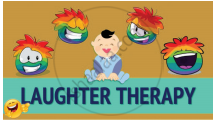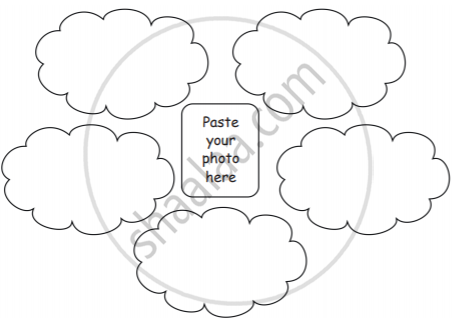Advertisements
Advertisements
Question
Now, read the following passage on “Laughter Therapy” and answer the questions that follow.

- Laughing is an excellent way to reduce stress in our lives; it can help you to cope with and survive a stressful life. Laughter provides full-scale support for your muscles and unleashes a rush of stress-busting endorphins. Since our bodies cannot distinguish between real and fake laughter, anything that makes you giggle will have a positive impact.
- Laughter Therapy aims to get people laughing, in groups and individual sessions and can help reduce stress, make people and employees happier and more committed, as well as improve their interpersonal skills. This laughter comes from the body and not the mind.
- Laughter Yoga (Hasya yoga) is a practice involving prolonged voluntary laughter. It aims to get people laughing in groups. It is practiced in the early mornings in open-parks. It has been made popular as an exercise routine developed by Indian physician Madan Kataria, who writes about the practice in his 2002 book ‘Laugh for no reason'. Laughter Yoga is based on the belief that voluntary laughter provides the same physiological as well as psychological benefits as spontaneous laughter.
- Laughter yoga session may start with gentle warm-up techniques which include stretching, chanting, clapping, eye contact and body movements to help break down inhibitions and encourage a sense of playfulness. Moreover, laughter is the best medicine. Breathing exercises are used to prepare the lungs for laughter followed by a series of laughter exercises that combine a method of acting and visualization techniques. Twenty minutes of laughter is sufficient to augment physiological development.
- A handful of small-scale scientific studies have indicated that laughter yoga has some medically beneficial effects, including cardiovascular health and mood. This therapy has proved to be good for depressed patients. This laughter therapy also plays a crucial role in social bonding.
Answer the following.
a. How does laughter help one to cope with stress?
b. Which word in the text (para 2) means the same as ‘dedicated'?
c. Why do you think voluntary laughter provides the same physiological as well as psychological benefits as spontaneous laughter?
d. ‘Laughter is the best medicine’. Explain.
e. Given below is a set of activities. Which of these are followed in the ‘Laughter Yoga’ technique?
- sitting on the ground with legs crossed
- body movements
- clapping
- closed eyes
- breathing exercises
- chanting
- stretching of arms and legs
- bending backwards
- running/jogging
- eye contact
f. ‘Laughter therapy also plays a crucial role in social bonding’. How?
Solution
a. Laughter provides full-scale support for one’s muscles and unleashes a rush of stress-busting endorphins. Thus it helps one to cope with stress.
b. ‘Committed’ means dedicated.
c. Human body cannot distinguish between real and fake laughter. Anything that makes a person giggle has a positive impact on one’s health. That is why I think voluntary laughter provides the same psychological and physiological benefits as spontaneous laughter.
d. Twenty minutes of laughter is sufficient to augment physiological development. Laughter has some medical benefits such as cardiovascular health and mood. Hence, “Laughter is the best medicine”.
e.
- Body movements
- Clapping
- Breathing exercises
- Stretching of arms and legs
- Bending backwards
f. Man is a social animal. Laughing breaks the ice and enables friendly conversations. A person endowed with spontaneous laughter naturally attracts large number of friends. In his company, even distressed relatives feel relieved and happy. Thus, laughter plays a crucial role in social bonding.
APPEARS IN
RELATED QUESTIONS
Orangutans use big leaves during a downpour because
Identify some of the improbable images the author has used to effect greater humour.
Study each of the following sentences and notice the balance between its parts. Pick out other sentences in the text that reflect this kind of balance
a. It is right that a false Latin quantity should excite a smile in the House of Commons; but it is wrong that a false English meaning should not excite a frown there.
b. Let the accent of words be watched, by all means, but let the meaning be watched more closely still, and fewer will do the work.
Find from the story one word for the following.
the highest-ranking official who commands a ship ______
Answer the given question in your own words.
Why did the swallow decide to stay under the statue of the Happy Prince at night?
Fill in the gap, choosing a word from the bracket to make an appropriate comparison.
(tall / quiet / humble / merry / busy / slippery / fast / sly / slow / big)
as ______ as a giraffe
Read the story and write about the following in short.
Yonamine Chiru of Okinawa
Find, in your science textbook, the topics of the stalls handled by students of VI A.
(Write the page number.)
Read the passage and answer the following:
When was the book written?
What do the following events/actions tell us about the characters? Discuss.
Sir Ector asked Sir Kay to show him whether he could draw the sword out of the stone.
Complete the following sentence with reference to the passage.
Nobody knows for certain who ___________________.
Imagine you are one of the three brothers. Write in short what you did with the rice.
Write other meaningful words that begin/end with anywhere.
Why had Prospero raised a violent storm in the sea?
Why do you think Mrs. Bodwell wanted to sell the house?
Who am I?
Who Am I? is a guessing game where players use ‘yes’ or ‘no’ questions to guess the identity of a famous person. Questions are based upon the traits and characteristics of a person everyone will be able to identify.
Divide the class into groups. One group should decide the personality while the other group should ask ‘yes’ or ‘no’ type questions. To win the game, a team needs to find out the person within 10 clues.
Sample questions to ask. Answers must be ‘yes’ or ‘no’ only
- Are you a male (female)?
- Are you a famous personality?
- Are you a singer (dancer, actor)?
- Are you a historical figure?
- Are you young (old)?
- Are you alive now?
- Does your name start with ‘___’?
- Is he/she ____ ?
Identify the speaker/character.
Wake up, child.
Match the rhyming words.
| filth | farmer |
| cook | harm |
| charm | wealth |
| armour | look |
Find the rhyming word from the poem.
alike – _________
Does it work its best?
The robot that sat on her shoulder was a______.
Anbu got ______ fish this week.
List out the questions to which you seek answer using 'Why?'

______was with Robinson.
Try your own.

Nithin had many ______toys.
Which problem do you think you can solve with art? How?
The brush ______ to her will.
Why should a fisher wait?
Find words from the passage which are antonyms of the following.
- artificially (para 1)
- strength (para 2)
